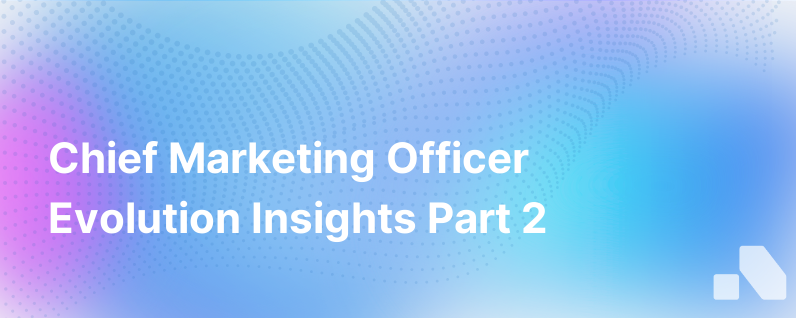
The role of the Chief Marketing Officer (CMO) has never been more exhilarating, nor more complex. Digital transformation is the buzzword that encapsulates the tumultuous changes within the marketing sphere, and where CMOs are finding themselves at the helm of brand reinvention and customer engagement innovation.
To understand the evolution of the CMO — the subject of our first part — we now delve into their burgeoning responsibilities and skills in this digitally driven era. It's a juncture where mar-tech, data analytics, and customer experience converge, necessitating a polymath of the highest order.
Digital Fluidity: The New CMO Mandate
The contemporary CMO's jurisdiction has blurred the lines between various disciplines. It’s not just about advertising or brand management; it’s about owning the customer experience end-to-end. The modern CMO must navigate a plethora of digital channels, from social media platforms to mobile apps and AI-driven customer service tools.
Data is the cornerstone of this digital fluidity. CMOs must now harness it to drive decisions and anticipate consumer trends, often in real-time. A refined skillset in analytics, therefore, has become indispensable, as has an understanding of customer relationship management tools.
From Evangelist to Technologist
CMOs are now part-brand evangelist, part-technologist. They're expected to lead digital transformation initiatives, introducing systems and automation that streamline operations and provide critical insights. This often requires a fundamental knowledge of the mar-tech landscape — a sprawling, ever-changing territory of software solutions.
As technologists, CMOs need to be adept in articulating requirements to IT and engineering teams, ensuring that the marketing infrastructure scales with organizational growth and agile enough to adapt to changing market dynamics.
Content: The Kingdom’s Bread and Butter
Content remains the bread and butter of any marketing team. But its creation and dissemination are now more nuanced. The CMO is tasked with overseeing content strategies that not only resonate across diverse global markets but are also optimized for search engines and tailored for an array of consumption formats — be it long-form articles, snackable social media posts, or immersive video narratives.
In essence, CMOs need a storyteller’s heart and a scientist’s mind to make content marketing impactful and measurable.
Embracing Customer Centricity
The digital age brought forth the empowered consumer — informed, connected, and voicing their opinions loudly on public forums. This shift necessitates that CMOs embrace complete customer centricity. They need to champion the voice of the customer within the company, ensuring that products, services, and customer journeys align closely with customer needs and expectations.
This often entails overseeing cross-functional teams across product development, customer service, and UX/UI design, instilling a holistic strategy that puts the customer at the core of corporate decision-making.
The Sustainability and Ethical North Star
With the rise of social consciousness, CMOs are increasingly influencers of their brand's ethical footprint. They oversee branding initiatives that reflect sustainability and corporate responsibility, which are no longer nice-to-haves but critical to the brand's identity and consumer perception.
This broader consciousness shifts coordinate closely with corporate communications and a firm’s broader public messaging, projecting a brand image that's not only current but conscientious.
Mastering Agility and Adaptability
The diverse range of responsibilities requires an agile and adaptable CMO. The ability to pivot strategies in response to market changes, experiment with new campaigns, and innovate with marketing technologies characterizes the most successful CMOs. An adaptable mindset, coupled with an ability to foster a culture of experimentation and learning within their teams, sets apart the trailblazers from the stragglers.
The Ever-Present Need for ROI
Despite the varied and complex nature of the role nowadays, at the end of the day, what matters most are the results. The evolved CMO makes data-driven decisions that need to translate into revenue. It's not just about brand awareness or lead generation; the ROI must be demonstrably tied to each initiative, campaign, or technological investment.
This performance-oriented approach calls for rigorous metrics and KPIs that track marketing effectiveness and prove the contribution of marketing to the business's bottom line.
Leadership Beyond Marketing
Lastly, the CMO's evolution reflects an expanded leadership role beyond the marketing department. It’s about influencing company culture, being a change agent, driving innovation, collaborating with C-suite peers, and communicating vision both internally and externally.
In many ways, the digital-era CMO is a business leader first, one who wields the power of marketing to drive business results, shape organizational change, and take the brand to new heights.
In Conclusion
The evolution of the CMO from a brand-centric leader to a technology-savvy, data-driven, customer-focused dynamo is one of the most striking developments in the business landscape today. As guardians of the customer experience and pioneers of digital transformation, CMOs have a significant opportunity to shape the future of their organizations.
Their journey is one of continuous learning, rapid adaptation, and leadership across the digital frontier. As they navigate these complex waters, the ones who can balance the art of marketing with the science of technology and data will thrive in this new world.
Part II of 'The Evolution of the Chief Marketing Officer' solidifies our understanding of how pivotal these figures are in the transformation of brands meeting modern consumer demands. It is no small feat, and with great responsibility comes great opportunity to redefine and deliver on new value propositions for both the consumer and the business.